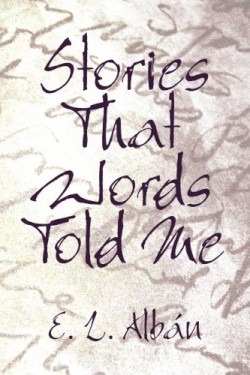Stories That Words Told Me
Here is E.L. Alban’s paean for the complexity and richness of words those “filigrees of language …. like seedlings on the furrows of a field / that blossom into gardens / on the expanses of the soul.” Alban presents twenty-one pieces fiction and non-fiction all of which participate in the feast. Alban’s essays are often biographical and they always contain story elements that make their subject easy to swallow. The stories readily posit themselves rather than the clinical-sounding topics of lexicography morphology or perhaps grammar as the true subjects of these entries.
In “Mumblings” he writes of his adolescence in the ’40s and ’50s in Ecuador and of the piropos a few phrases of ritual blandishments that boys used in attempt to put an arm around girls at the movies. In this tale Alban gets the girl with a quite unusual piropos. In another musing the mature Alban meets the Roman poet Ovid who tells Alban that the gods of today are secular and depersonalized. They can be found in the Church (the Vatican and most religious leaders have godlike stature) government (the Pentagon 10 Downing Street) and other institutions (Wall Street Madison Avenue Hollywood and many more). Ovid whose retelling of the myth of Hermaphrodite in Metamorphoses helped to explain the origin of homosexuality gives the writer an idea for a fiction of his own that will explain the metamorphosis of “homosexuality”—another clinical term—into the friendlier “gay.”
Enjoyable to scholars as well as general readers Mr. Alban’s stories are sometimes fantastic; one takes place inside a human brain where some neglected economic words (“underemployment” and “marginal propensity to consume”) are “buried” i.e. suppressed repressed or perhaps forgotten in a brain graveyard. Another takes place at a Word Fair (pun on World’s Fair) where words come alive and reside at hotels like the American Heritage and Webster’s and among other attractions and exhibits an argument rages over the hotel’s discrimination against a word that begins with f. In a more realistic story a brilliant young Argentinian English major who visits the U.S. and at a downright hilarious dinner party confronts her weakness in American idiomatic expressions. As for “you hit the nail on the head” she protests with good reason “where else would you hit it? It doesn’t have arms and legs!” She can’t see why someone would want only a “piece” of ass. Indeed why not leave the thing intact?
A former professor of Economics and Statistics in the University of Georgia system E.L. Alban has been a contributor to academic journals and is also a published poet. He and his wife have homes in Georgia and Kansas and have traveled widely as the settings in this book—Japan Italy and both North and South America—demonstrate. Alban tells us that wherever they are spoken words are too lifelike to obey the definitions and descriptions given to them.
Disclosure: This article is not an endorsement, but a review. The publisher of this book provided free copies of the book and paid a small fee to have their book reviewed by a professional reviewer. Foreword Reviews and Clarion Reviews make no guarantee that the publisher will receive a positive review. Foreword Magazine, Inc. is disclosing this in accordance with the Federal Trade Commission’s 16 CFR, Part 255.

